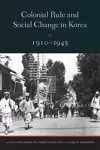
Colonial Rule and Social Change in Korea, 1910-1945
3 contributors - Hardback
£95.00
Akihiro Iwashita is a professor at the Slavic-Eurasian Research Center, Hokkaido University. His research focuses on the Sino-Russian borderlands and on the Japan-Russia “Northern Territories” issue. He has authored and edited several books and numerous articles, notably Japan’s Border Issues: Pitfalls and Prospects (Routledge, 2016) and A 4,000 Kilometer Journey Along the Sino-Russian Border (Slavic Research Center, 2004). He served as Coordinator of Border Region in Transition XII Conference (Fukuoka-Busan: 2012) and as President of Association for Borderlands Studies (2015–2016). He has received many grants and fellowship, including at the Brookings Institution’s Center for Northeast Asian Policy Studies (2007–2008), and prizes, such as IBRU’s 2nd Milefsky Award (2019), the 24th Regional Publication Prize (2011), and the 4th Japan Society for the Promotion of Science Prize (2007). He was also nominated for the Asahi Newspaper’s 6th Osaragi Jirō Prize for Commentary (2006).
Yong-Chool Ha is the Korean Foundation Professor at the Jackson School of International Studies, University of Washington, and is an emeritus professor at Seoul National University. He has written extensively on North Korea, South Korea, East Asia, and Russian foreign policy, as well as on late industrialization and social change. Particular research interests include community building and international relations theories, and changing elite-mass relations in late industrializing countries. He is currently finishing a book examining Late Industrialization, the State and Social Change in a comparative perspective. Major publications include The Dynamics of Strong States (SNU Press, 2006), Late Industrialization, the State and Tradition: the Emergence of Neofamilism in Korea (CPS, 2007), and the edited volumes Colonial Rule and Social Change in Korea, 1910–1945 (University of Washington Press, 2013) and International Impact of Colonial Rule in Korea, 1910–1945 (University of Washington Press, 2019).
Edward Boyle is an associate professor at the International Research Center for Japanese Studies, Kyoto, and is editor of the Japan Review. He researches the boundaries and borderland spaces of Japan and its neighborhood, as well as in India’s Northeast and in the wider Asia-Pacific. He has written extensively on historical borders in Northeast Asia, and his doctoral research examined the incorporation of Hokkaido into Japan prior to the nineteenth century. Subsequent research on the contemporary transformation of Japan’s borders and policies has been supported by JSPS, SSHRC, Jean Monnet Network funding, and the Borders in Globalization project. Particular interests include maps and representation, territoriality, infrastructure, heritage, and memory. Recent projects include an investigation into the Borders of Memory that shape the political role of heritage within and between Asian states.